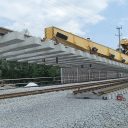


Why reduced track access charges are not enough for railways
Reduction of track access charges is becoming more and more popular in European countries. Some governments are even considering the possibility to suspend them. Of course, it is good for railway undertakings to boost their...Read more
France to suspend track access charges
Railway undertakings in France will receive a powerful impulse from the government to relaunch their businesses. There will be zero track access charges, which will be active until the end of 2020. In order to...Read more
Railways need reimbursement agreements (column)
The Track Access Charges (TACs) are one of the most significant financial sources for infrastructure managers. However, they are not applicable to recovering the infrastructure investments costs. But, in some cases, they can be a...Read more
‘Infrastructure costs influenced by many interrelated factors’
Track Access Charges is a quite complicated and important topic for the EU railways. Despite the differences between the charging systems being acted in the various Member States, they could be classified into two major...Read moreRailTech presents Track Access Charges Magazine
The editorial team of RailTech has prepared the ‘Track Access Charges Magazine’. It covers various aspects of access charging on rails. “Our editorial team has created the ‘Track Access Charges Magazine’ where you can find more...Read more
‘Level playing field across the modes is vital for European Green Deal’
Europe moves towards a zero-emission economy. This ambitious goal must be achieved by 2050 within the implementation of the European Green Deal, the new strategy of the European Union focused on improving the well-being of...Read more
Track Access Charges Summit 2020 open for registration
The Track Access Charges Summit 2020 is open for registration. The event will take place on 21-22 April at the Railway Museum in Riga, Latvia. Two key topics will be discussed by the rail professionals:...Read more
